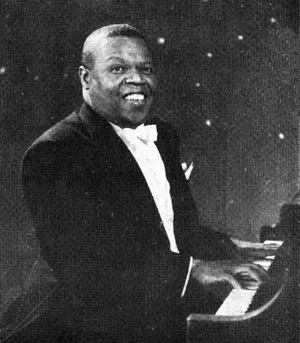GALA's tribute to Cuba's 'King of Song' has strong music, fizzled plot
- Submitted by: admin
- Music
- 06 / 14 / 2010

Cuban playwright Hector Quintero had a good idea when he decided to write a tribute to one of Cuba's most influential and famous composers and singers, Ignacio Jacinto Villa, known affectionately as El Bola de Nieve ("Snowball").
The legendary Cuban singer became famous in the international music scene in the 1930s and his fame lasted in America, Latin America and Europe until his death in 1971.
GALA Hispanic Theatre is producing Quintero's play, "El Bola -- Cuba's King of Song." The production, which suffers from an unbalanced script, deserves credit for its sensational singing, its exuberant Latin dancing, and its extraordinary music, provided by four musicians (Sin Miedo) under the direction of Didier Prossaird.
"El Bola" begins by introducing the main character, in his time and place. His picture appears in a round portrait frame above the stage as the actor playing Ignacio (Marcelino Valdes) steps onto the stage. Like El Bola, he seems larger than life, his voice a bit scratchy. As Villa said of himself "I have the voice of a mango seller."
Fortunately for posterity, there is considerable footage of Villa as he sat at the piano, playing and singing. There are also still photographs and portraits, so the physical reality of the man is created as Valdes creates his vocal reality through song.
As soon as the play establishes Villa's apparent gentleness, his humor, his devotion to sad and sweet love songs, however, the script veers in a different direction, becoming a musical about a musical. The time switches to the present day in Washington, where Hector (Carlos Castillo) is a director who wants to stage a musical homage to El Bola.
In the process of planning his show, Hector must audition a number of singers and dancers. So far so good, since one of the auditioning performers is Marian (Enrique Divine), a flamboyant transsexual, who is determined to be in Hector's show.
Both Divine and Castrello are accomplished singers. Divine's "La Vie En Rose" is nothing like Edith Piaf's, but powerful in its own right. Castrello breathes life into a wide variety of songs -- from the gentle "La Flor de la Canela" to the dynamic "Babae." Dan Iwaniec has designed imaginative, colorful outfits for both performers.
But in Act II the plot fizzles out. The idea of the musical review is still there but the focus is now on Hector, his uptight wife (Karen Morales), and the fact that money is needed so the show can go on. Cue the "santera" (Castrello) a healing woman who is brought in to practice Yoruba magic and cleanse the Washington home so Hector's luck will change.
Director Hugo Medrano mentions in his director's notes that in this play Quintero was "affectionately making fun of two characters familiar in Havana today -- a transsexual and a santera." It's hard to see how that dramaturgical detour away from Villa helps tell the story of the unique musician who claimed to prefer expressing emotion to impressing people.
Perhaps there was just not enough biographical material to write solely of Villa, but the most memorable moments in this show are still Villa's spoken words, his exquisite lyrics and music, and the ironic sense that this self-deprecating genius -- who seems always to have been photographed with a big grin -- was most adept at capturing moods of loss, longing and sadness.
By: Barbara Mackay
Source: www.washingtonexaminer.com/
Comments